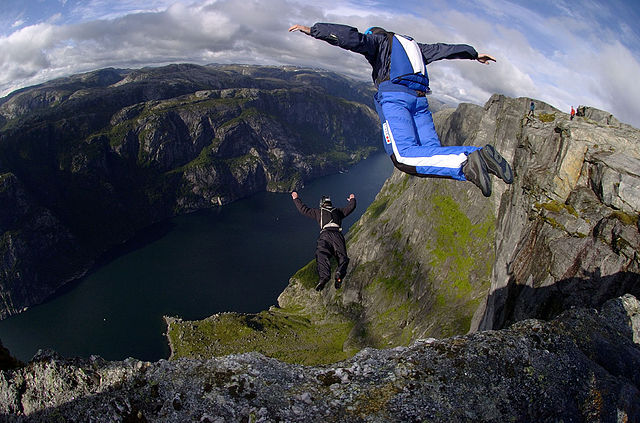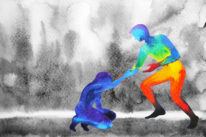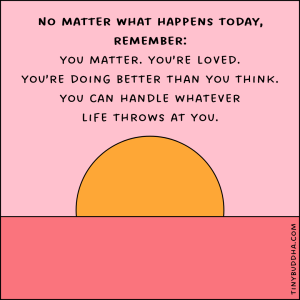
“To be fully alive, fully human, and completely awake is to be continually thrown out of the nest.” ~Pema Chodron
Winter is a time for hibernation, I told myself, drinking a second cup of coffee under the duvet, flicking absent-mindedly through old magazines and self-help books bought in a brief conviction that I wouldn’t begin another year reading in bed.
It seems perverse that, in the Northern Hemisphere at least, this time meant for reunion and resolution (neither of which is easy or straightforward) should occur in the darkest of seasons—when the sun barely even rises and the general inclination is to climb into a hole and only reemerge in spring.
This year I had returned home after a five-year absence, which had seemed longer. During that time, I had spent Christmases in random parts of Asia that, if listed, would sound romantic and exotic—temples, jungles, and mountains.
But that time had been largely marked by loneliness and bewilderment at why I always choose to be far from those I’m meant to be closest to.
Travel, in its constant offering up of newness and discovery, always seems to promise another chance at reinvention. Maybe this is in part why I do it, never having found a version of myself I’m comfortable enough to settle with.
And yet, once back in familiar surroundings and familiar relationships, it never takes long for this promise to fade and for old habits to reappear. Over the past weeks, I’ve had to keep checking photos, maps, postcards, just to remind myself that what had gone before was in fact something I lived, not merely a dream.
The previous three months I had been traveling, over-ambitiously combining Thailand, China, and India in an attempt to compensate for a year of teaching in a chaotic Asian city.
My intention had been to get myself out of the dysfunctional routine I had created while teaching—the six-day work-week, an addiction to HBO and my sofa, overreliance on a few good friends—and throw myself back into Life with a capital L.
Unfortunately, over the course of the year, I had learned to become a person suited to precisely such a routine, cutting off the part of myself that secretly wanted connection and community even as I hid away.
After all, old habits die hard. During the acute social phobias of my teens and twenties, I had become skilled at avoidance—often not stepping out onto a street for days on end—and while one of my tough-love strategies for overcoming the fear had been to start working as a teacher and traveling the world, it now became painfully clear that it was still there, still part of the baggage.
So now I was out of the nest all right, but once more I had completely forgotten how to fly. Learning how to travel again was beautiful, awful, and everything in between.
At times, I wondered for my sanity: stranded in a Chinese railway station trying to mime my way to a destination I couldn’t pronounce, alone on the Tibetan grasslands with a monk (a rock wrapped in his long red robes in readiness for the wild dogs), up in the bitter winter of the Himalayas, trying to reconnect with a lover who no longer loved me.
This was life with a capital L, and it broke up all my expectations, over and over, until I could finally feel myself starting to open up and see that life had been there all along.
But then, just as I was beginning to fly again—the hard way of course, with broken wings and battered ego—it was time for home.
Here I was, in rural England, in the dark of winter, taking off my wings once again.
It was good to be back, but after the first few days of reconnection, I soon slipped back into avoidance and the usual grievances of “why people hadn’t changed” (ignoring, of course, that I was still in part the spoiled adolescent who had left so many years before).
It wasn’t that the nest was uncomfortable; after all I had witnessed in Asia, the ease of life at home was a daily miracle, and I was grateful for the chance to rest.
It was more that being back brought up those old fears and doubts about self-worth, ability, and the world outside my window that threatened to keep me there much longer than was necessary.
My parents are not the sort to push me out—quite the opposite—but this is perhaps part of the issue. Their acceptance of me is something I still can’t seem to provide for myself.
I feel lucky to have their support and love, but part of the reason I had journeyed for so long was in an attempt to find out how I could be with myself, how to leave the safe space of home, test my wings, and see where they could take me.
Coming back, it was clear I still hadn’t learned this real sense of independence, part of me eager to crawl under the covers and hibernate, part of me angry that this was still what I wanted to do.
So, as the New Year beckoned, it couldn’t be a question of waiting to be thrown from the nest, but more of throwing myself out once again, not knowing yet if my wings would have regrown in time, not yet sure where it was I even wanted to go.
In times like these, when everything seems suddenly in doubt—from fiscal cliffs to global power shifts and unemployment—none of us can afford to wait for certainty.
To be alive, then, to be fully awake, is perhaps to keep throwing yourself from the nest (if life doesn’t do it for you first), not in some suicidal dive to the bottom, but in the faith that you will always remember how to fly if you trust in yourself that much.
Looking back over all the radical transitions between cultures and countries, some ideas emerge that I hope will help with whatever comes next:
You will never be ready.
My whole life, I have had the tendency to postpone. How can I love until I’m 100% loveable? How can I get the job until I have all the qualifications in the world? But thankfully, travel doesn’t allow this luxury.
Again and again, I had to get up, catch the train at dawn, thumb down the car when the bus had broken, keep turning up when I wanted to hide. We can all do this, every day. And more often than not, we’ll find that it was never a question of being “ready,” but simply of being present to however things are.
Let go.
Let go of your grip onto what you think is permanent. Let go of your fear that there is nothing better out there. Let go of the people you’ve been holding too tightly in the dread of being alone.
Hold on.
Let go, but don’t give up. I have run away from people and places many times, wiping them from memory in an attempt to manufacture a fresh start. Instead, what I was doing was giving up on myself: I wasn’t enough to make people happy. I wasn’t able to make the place work.
Often, when you run away from something, you risk confirming your own lack of faith in yourself and others. The “nest” isn’t necessarily a place; it’s more a state of mind, and so sometimes staying with what is difficult—in yourself or others—is the hardest journey of all.
Be kind to yourself when you fall.
Flying is a difficult skill. Give yourself credit for even trying. Most people spend their life in the nest, choosing to ignore their wings until they wither and drop off. If you have had the courage to leap, even once, celebrate that.
Whether you soared or plummeted doesn’t matter. You tried, and there is always a next time. There has to be. That’s the nature of life.
Photo by X0f711
About Clare Blackburne
Clare is an English teacher, writer, and world-traveler who has spent the last six years wandering her way through Asia in search of happiness, short cuts to spiritual enlightenment and the perfect pot of masala chai.













 Though I run this site, it is not mine. It's ours. It's not about me. It's about us. Your stories and your wisdom are just as meaningful as mine.
Though I run this site, it is not mine. It's ours. It's not about me. It's about us. Your stories and your wisdom are just as meaningful as mine. 